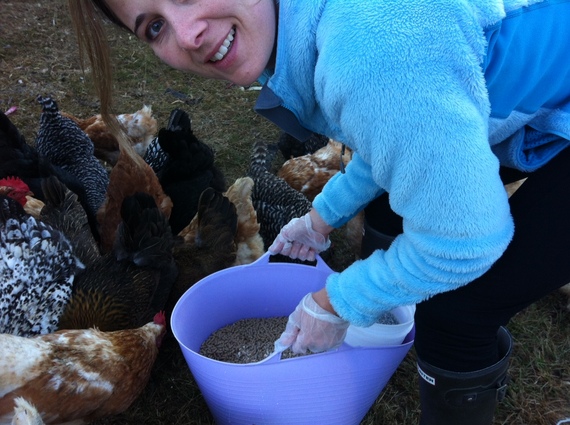
In summer, my children rekindle their love affair with nature by climbing trees in their bare feet, high on the season, wanting more of everything, as people do.
"Can we get a hamster? A bird?" they plead with hands unfurled, offering up their nosegay of life savings to the family bank.
"No way," my husband and I groan.
The kids already know the rule -- no house pets other than our beloved family dog. That is final. But we don't say no to more animals, exactly.
Instead of bringing home goldfish from the town fair or letting hamsters go rogue between our bedroom walls, my family takes care of the chickens at our local farm.
For eight separate weeks throughout each year, we feed and water the chickens, collect and clean their eggs, and put those eggs up for sale in the farm stand.
As with traditional pets, there are times when this responsibility falls solely on one parent or another, without our children's involvement at all.
Last summer, I arrived late for chicken duty and the hens had already gone to roost in the open-air barn next to the coop. I worried they would fall prey to coyotes overnight, so I stood on a chair and plucked them from the rafters, one by one. The birds flapped their wings around my trembling hands, gripped the wooden trusses and squawked wildly in protest; I continued pulling them down, laughing maniacally, until all 30 chickens were safely perched inside the coop.
At other times, we enlist extra help.
My mother is an avid birder who travels to remote parts of the world to cross species off her treasured life list. Last fall, she accompanied us to the farm for the first time.
I opened the coop and she stumbled backwards, holding her nose.
"Yeah, it's pretty bad," I agreed, the timbre of my voice shifting to a nasal drone as I tried to block the stench.
I handed my mother a wire basket and suggested she collect eggs from the nesting boxes. She unfastened the barrel bolts, pulled open the hatch and reached under a hen to pull out the first egg. She clutched it to her chest.
"It's warm!" she gasped, her eyes wide.
"Yesss!" my daughter gushed in reply as she traipsed around the yard, capturing truant hens.
My two-year old dug into a dusty pail and threw out fistfuls of scratch (junk food for chickens), distracting the brood while I topped off their feed containers.
As usual, my kindergartener wouldn't hold the chickens, but he stood in the middle of the fenced-in run and used his pointer finger to sort the flock -- Silver Lace, Red Star, Barred Rock and the elegant Araucana variety that lays eggs with blue-toned shells.
At dinner that night, my daughter wondered if I'd cooked up the half-sized eggs from the younger Silkie hens with whom she likes to cuddle; when I answered yes, she actually tried my asparagus frittata.
I often find myself making batches of French toast on Wednesday mornings when cold cereal would do just fine.
Caring for the animals we use for food is a self-centered lesson, but it's better than confining parakeets to a cedar perch for a stale and flightless life.
I had parakeets when I was a child, but over the many years they stayed alive, I loved them less and less. After school one day, I discovered a brown lunch bag sitting on the kitchen counter. I peeled apart the paper fold and found my yellow parakeet lying on his side, his eyes shut and coiled with mites, his talons curled up in rigor mortis like crisp cherry twigs. I wept, but my mother just shrugged and we both knew why: I hadn't really cared for him anyway.
I thought of my parakeet recently when I found two lifeless Red Star hens, their bodies plunked like discarded clothing in the grass. Their closed eyelids looked thin, like parchment, and their mouths hung open.
My daughter saw them and cried out, feigning a sniff and a sob.
"Don't pick them up by their tails!" she wailed, skittering along the electric fence as I nabbed the two heavy, feathered rumps and dropped them into a plastic bag.
When we closed up the coop that evening, all three of my children had questions.
"Sometimes they die and we don't know why," I replied.
Satisfied, my son walked behind the squash barn and reappeared dragging a rusty go-kart by a towrope. He saddled the kart with a wooden plank, sat down, and clutched the wheel. My daughter gave him a push and sent him careening down a muddy hill, hee-hawing madly toward the duck pond.
Simply being at the farm is gratifying, but when a new batch of chicks was introduced to the coop last month, my children had something more to celebrate this summer after all. For me, it's enough that the hens get to make their mess all over the farm's yard, leaving my family to run barefoot in ours.
